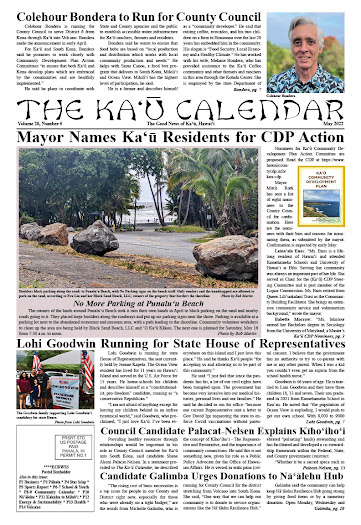| Image may be NSFW. Clik here to view. .JPG) |
| Phase 1 of a water project for Department of Hawaiian Home Lands lessees at South Point broke ground Friday. It will connect Pastoral homestead lessees in the Kamāʻoa Homestead to water service through a partnership with Hawai'i County. Photo from DHHL |
GROUNDBREAKING FOR WATER SERVICE TO HAWAIIAN HOME LANDS AT SOUTH POINT launched Phase 1 on Friday morning. The statement from Department of Hawaiian Home Lands says its "improvements to an existing County of Hawaiʻi Department of Water Supply system in Kaʻū will soon connect Pastoral homestead lessees in the Kamāʻoa Homestead to water service."
The groundbreaking celebrated the ultimate connection of the newly built DHHL water storage and distribution system to the county Department of Water Service ’ No. 108 system in Kaʻū. Phase 1 of the DHHL project is being accomplished by Isemoto Contracting Company, to include installation of a 100,000-gallon water reservoir to serve Pastoral homestead lots awarded to native Hawaiians in the mid-1980s.
The groundbreaking celebrated the ultimate connection of the newly built DHHL water storage and distribution system to the county Department of Water Service ’ No. 108 system in Kaʻū. Phase 1 of the DHHL project is being accomplished by Isemoto Contracting Company, to include installation of a 100,000-gallon water reservoir to serve Pastoral homestead lots awarded to native Hawaiians in the mid-1980s.
DHHL reports, "These lessees, part of the Department’s Acceleration Program, were awarded to native Hawaiians as raw land following a 1983 report by a Federal and State task force that recommended to the State of Hawaiʻi that DHHL should issue undeveloped raw land to native Hawaiians. The program’s effort was to accelerate the distribution of land to beneficiaries of the Hawaiian Homes Commission Act. DHHL issued 2,629 leases of mostly raw land between 1984 and 1987 as part of the program. Since the issuance of lots under the Acceleration Program, the Department has incrementally installed infrastructure, as
| Image may be NSFW. Clik here to view.  |
| Department of Hawaiian Home Lands Chair William Ailā, Jr. on Friday morning, during the groundbreaking of a new water system for Hawaiian Home Land Lessees at Ka Lae. Photo from DHHL |
funding became available. DHHL has plans to complete infrastructure improvements for the remaining Acceleration Program lots on Molokaʻi and Hawaiʻi Island over the next three to five years."
Hawaiian Homes Commission Chair William J. Ailā, Jr. said, “Partnerships with the County and other agencies are critical in the development of infrastructure for DHHL projects. Building these improvements to County standards allows DWS to adopt it into its existing system, a critical piece that is allowing this project to happen. A water tank is the first step towards resolving a longstanding obligation DHHL made to Kamaoa lessees.
"The Department’s acceleration program provided pasture lots to native Hawaiians without access to water and placed the responsibility of advocating for future infrastructure improvements in their hands. Today, we take a meaningful step toward delivering access to water for the Pastoral lots.”
"The Department’s acceleration program provided pasture lots to native Hawaiians without access to water and placed the responsibility of advocating for future infrastructure improvements in their hands. Today, we take a meaningful step toward delivering access to water for the Pastoral lots.”
The $2.7 million Capital Improvement Project is funded by a Fiscal Year 2020 appropriation from the Hawaiʻi State Legislature. Phases 2 and 3 of the Kaʻū Water System project are designed to work on pressure regulating valves, new water meters, and improvements to South Point Road for future homesteading opportunities.
In March, DHHL broke ground on 125 Residential lots in the Villages of Laʻi ʻŌpua Village IV Hema Phase 2 subdivision in Kealakehe, and last month began infrastructure construction on 16 Subsistence Agricultural lots in Honomū."
Human diseases to be reduced or prevented in Hawai'i include the viruses Zika, dengue, chikungunya, yellow fever and West Nile, along with the disease lymphatic filariasis. Diseases of Hawai'i’s fauna to be reduced include avian malaria, avian pox, and dog heartworm.
To read comments, add your own, and like this story, see www.facebook.com/kaucalendar/. See latest print edition at. www.kaucalendar.com. See upcoming events at https://kaunewsbriefs.blogspot.com/2022/04/upcoming-events-for-kau-and-volcano.html
PUBLIC INPUT ON A PLAN TO IMPORT MOSQUITOS INTO THE HAWAIIAN ISLANDS and release them, in order to reduce existing mosquito populations, is a request from the state Department of Agriculture. The targeted mosquitoes have led to extinction and near extinction of native Hawaiian birds and also pose a health risk to humans and animals.
The state Board of Agriculture approved of the concept this week to import the Asian tiger mosquito Aedes albopictus, the yellow fever mosquito Aedes aegypti, and the southern house mosquito Culex quinquefasciatus, adding them to the List of Restricted Animals that allows regulated introduction into the state.
The proposed order and proposed rule changes may be viewed online at: https://hdoa.hawaii.gov/blog/main/proposed-administrative-rules/
Through June 8, Hawai`i Department of Agriculture, Plant Quarantine Branch, will accept comments through Jonathan Ho, Inspection and Compliance Section Chief. Send to Jonathan.K.Ho@hawaii.gov.
| Image may be NSFW. Clik here to view.  |
| Asian tiger mosquito was a likely vector in the Dengue outbreak that started in South Kona in 2015. Photo from entomologytoday.org |
Through June 8, Hawai`i Department of Agriculture, Plant Quarantine Branch, will accept comments through Jonathan Ho, Inspection and Compliance Section Chief. Send to Jonathan.K.Ho@hawaii.gov.
The plan is designed so that the targeted female mosquitoes mate with the introduced mosquitoes. A bacterium in the imported males' reproductive systems makes the mating unproductive and the populations of the targeted mosquitos are reduced.
The process is called cytoplasmic incompatibility. According to the statement from Department of Agriculture, "Cytoplasmic incompatibility has been used with much success in other parts of the world to reduce mosquito populations and thus reduce the potential of transmission of mosquito vectored diseases."
| Image may be NSFW. Clik here to view.  |
| Yellow fever mosquito is a vector of of numerous viruses including Zika, dengue, chikungunya, yellow fever and West Nile. Photo from entomologytoday.org |
The targeted mosquito species "are invasive, disease-spreading mosquitoes that can be found throughout Hawai'i," reports Department of Agriculture. The Asian tiger mosquito and yellow fever mosquito "are believed to have been the primary vectors during Maui’s 2001 dengue virus outbreak, Oahu’s 2011 dengue virus outbreak, and Hawai'i County’s 2015-2016 dengue outbreak, which led to more than 264 cases of the illness."
The southern house mosquito is known to vector West Nile virus on the U.S. mainland and lymphatic
filariasis in other Pacific nations. The species is present on Hawai'i, Maui, Moloka'i, Lana'i, Kaho'olawe, O'ahu, Kaua'i, and the northwest Hawaiian islands. Department of Agriculture reports that it can thrive at sea-level to 4.800 ft..
| Image may be NSFW. Clik here to view.  |
Southern house mosquito carries avian malaria, which has devastated the population of native forest birds and also carries dog heartworm. Photo from entomologytoday.org |
Concerning Hawai'i’s native forest birds, the southern house mosquito is a known vector of avian malaria and the yellow fever mosquito is a vector of avian pox. "These diseases have contributed to the extinction of more than half of Hawai'i’s endemic honeycreepers and continue to pose a risk to the remaining species. Lastly, these mosquito species are known to transmit dog heartworm within pets found throughout Hawai'i," says the Department of Agriculture statement.
DOA notes that efforts to suppress these mosquitoes through pesticides "are inadequate at a landscape scale, and may be problematic for other non-target state and federally protected invertebrate species including Hawaiian picture-wing flies, damselflies, yellowfaced bees and anchialine pond shrimps."To read comments, add your own, and like this story, see www.facebook.com/kaucalendar/. See latest print edition at. www.kaucalendar.com. See upcoming events at https://kaunewsbriefs.blogspot.com/2022/04/upcoming-events-for-kau-and-volcano.html
COUNTY PROSECUTOR KELDEN WALTJEN SENT OUT A MESSAGE FRIDAY EVENING, urging Gov. David Ige to sign House Bill No. 1486, HD2, SD1 (“HB 1486”) into law. The legislation would increase the penalty for felony theft of motor vehicles and motorcycles from a maximum five-year prison term to a maximum ten-year prison term.
“We encourage the public to join us in support of the passage of HB 1486, share their concerns about
how auto and motorcycle theft has affected our community, and request that Governor Ige sign this bill into law,” said the Prosecuting Attorney. "Currently, most auto and motorcycle thefts are prosecuted as Theft in the Second Degree and/or Unauthorized Control of a Propelled Vehicle in the First Degree, both of which are only class C felony offenses punishable by a maximum five year prison term."
| Image may be NSFW. Clik here to view.  |
| County Prosecuting Attorney Kelden Waltjen urges citizens to encourage the governor to sign a bill increasing prison time for auto and motorcycle theft. |
HB 1486, introduced by Rep. Greggor Ilagan, State House District 4 representing lower Puna, establishes Theft of Motor Vehicles and Motorcycles as a subsection of Theft in the First Degree, which is a class B felony offense punishable by a maximum ten year prison term.
This past December, the Hawai‘i County Prosecutor’s Office conducted an online legislative initiatives survey. Of those 1,422 who participated in the survey, 1,265 or 89.21% supported establishing Theft of a Motor Vehicle as a class B felony offense. “By increasing the penalty for auto and motorcycle theft, we promote respect for the law, ensure that offenders 2 receive an appropriate sentence that reflects the seriousness of the offense, provide adequate deterrence for future criminal activity, and protect the public,” said Waltjen. He urges submitting testimony via the Governor’s website at https://governor.hawaii.gov/contact-us/comments-on-legislation/.
To read comments, add your own, and like this story, see www.facebook.com/kaucalendar/. See latest print edition at. www.kaucalendar.com. See upcoming events at https://kaunewsbriefs.blogspot.com/2022/04/upcoming-events-for-kau-and-volcano.html
LANDSCAPING WITH NATIVE HAWAIIAN PLANTS on Saturday, May 14 from 9 a.m. - 2 p.m. at Volcano Art Center’s Niaulani Campus will be led by instructor Zach Mermel of Ola Design Group. In this hands-on workshop, you’ll interact first-hand with a variety of native plants found throughout Hawai’i and learn how to integrate these plant allies into your home ecosystem. Class fee is $35/$30 for VAC members. To register, call (808) 967-8222 or visit volcanoartcenter.org/events/.
KAHUKU COFFEE TALK: ʻUAʻU: THE ENDANGERED HAWAIIAN PETREL will be on Saturday, May 14 from 9:30 - 11 a.m. at Kahuku Unit Visitor Center. Coffee Talk at Kahuku is an opportunity to get to know your Park and your neighbors, and join an informal conversation on a wide variety of topics on the second Saturday of every month. Entrance located south of the 70.5 mile marker on the mauka side of Hwy 11.
KAHUKU COFFEE TALK: ʻUAʻU: THE ENDANGERED HAWAIIAN PETREL will be on Saturday, May 14 from 9:30 - 11 a.m. at Kahuku Unit Visitor Center. Coffee Talk at Kahuku is an opportunity to get to know your Park and your neighbors, and join an informal conversation on a wide variety of topics on the second Saturday of every month. Entrance located south of the 70.5 mile marker on the mauka side of Hwy 11.
| Image may be NSFW. Clik here to view.  |
| Flyer for Coffee Talk at Kahuku: 'Ua'u, The Endangered Hawaiian Petrel. Image from Kahuku Unit, Hawai'i Volcanoes National Park. |
SEE MORE UPCOMING EVENTS IN KAʻŪ & VOLCANO
| Image may be NSFW. Clik here to view.  |
See The Ka'ū Calendar May edition at www.kaucalendar.com, on newsstands and in the mail.\ |

.jpg)

